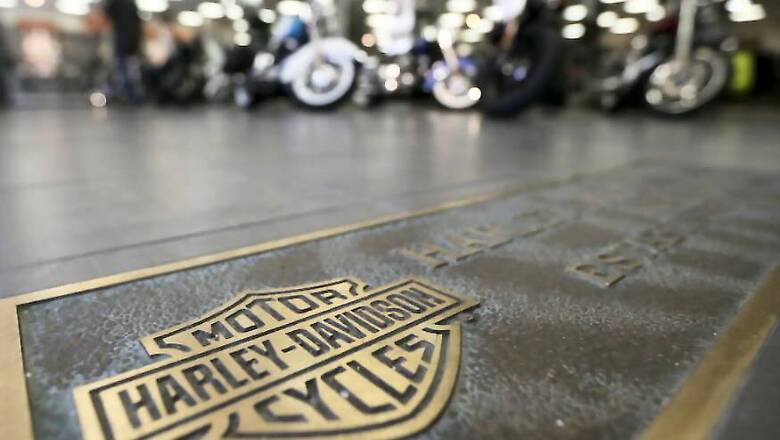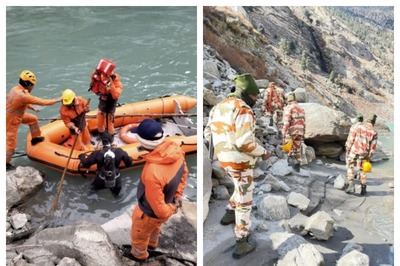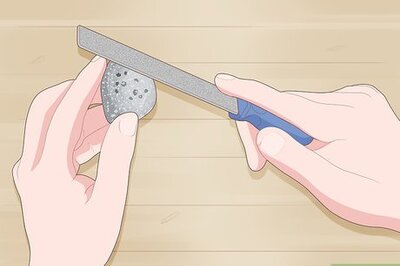
views
Washington: Harley-Davidson has announced plans to shift some of the production of its iconic motorcycles overseas against the imposition of steep import tariffs by the European Union, leaving US President Donald Trump "surprised".
Trump, who has been taking up the case of tariffs on Harley-Davidson by India, which in part is responsible for the current trade tension between the two countries, expressed disappointment at the company “waving the white flag”.
"Surprised that Harley-Davidson, of all companies, would be the first to wave the White Flag," Trump said on Twitter. "I fought hard for them and ultimately they will not pay tariffs selling into the EU, which has hurt us badly on trade, down $151 Billion. Taxes just a Harley excuse — be patient!"
Surprised that Harley-Davidson, of all companies, would be the first to wave the White Flag. I fought hard for them and ultimately they will not pay tariffs selling into the E.U., which has hurt us badly on trade, down $151 Billion. Taxes just a Harley excuse - be patient! #MAGA— Donald J. Trump (@realDonaldTrump) June 25, 2018
Outside the US, Harley-Davidson has manufacturing facilities in India, Brazil and Australia. It is building a plant in Thailand.
The company in its US Securities and Exchange Commission (SEC) filing on Monday said that new retaliatory tariffs by the European Union (an increase from six percent to 31 percent) will result in an incremental cost of approximately $2,200 on an average motorcycle exported from the US to the EU.
"To address the substantial cost of this tariff burden long-term, Harley-Davidson will be implementing a plan to shift production of motorcycles for EU destinations from the US to its international facilities to avoid the tariff burden," said the company, without indicating to which country it plans to move its production facilities to.
Harley-Davidson said that shifting targeted production from the US to international facilities could take at least nine to 18 months to be fully completed.
"Increasing international production to alleviate the EU tariff burden is not the company's preference but represents the only sustainable option to make its motorcycles accessible to customers in the EU and maintain a viable business in Europe," the company said.
Some analysts expect to see more instances of company shifts in supply chain or manufacturing venues due to trade tariffs when the second-quarter earnings season kicks off in early next month.
Fading Sales
Harley-Davidson has been relying on Europe and other international markets to help offset declining sales in the US, where the baby boomers who have long bought the vehicles are aging and younger consumers are not taking to the motorcycles in a big way.
In the first quarter, retail sales of motorcycles fell 12 percent in the United States but rose nearly seven percent in the European/Middle East/Africa region.
In the wake of the sluggish US sales, Harley-Davidson announced in January it would close its Kansas City, Missouri assembly plant and consolidate jobs in York, Pennsylvania.
Adding to the difficulty facing the company were steel and aluminum tariffs on the EU, Canada and Mexico finalized by the Trump administration at the start of June.
Unions React
A spokeswoman for House Speaker Paul Ryan, a critic of Trump's trade policies, said Harley-Davidson's travails were "further proof of the harm from unilateral tariffs. The best way to help American workers, consumers, and manufacturers is to open new markets for them, not to raise barriers to our own market."
But the International Association of Machinists and Aerospace Workers, which represetns Harley-Davidson workers in Missouri, Pennsylvania and Wisconsin, denounced the move as a pretext and a "slap in the face" to the company's workforce.
"Even before the EU's announcement, Harley made the decision to close its plant in Kansas City and has manufacturing facilities in India and Brazil," International President Robert Martinez said in a statement.
"Will Harley use any excuse to ship jobs overseas? Does Harley even understand what 'Made in America' means?"
United Steelworkers, a labor union representing some of the motorcycle maker's US employees, said Monday that Harley-Davidson had long since begun to shift its manufacturing operations abroad.
Analysts have noted the irony of Harley-Davidson's plight given that its executives were among the first to visit the White House in February 2017 shortly after Trump took office.
Trump praised Harley-Davidson as an "American icon, one of the greats" and expressed confidence the company would expand US manufacturing under his administration.
But that status made the company a target for EU retaliation along with bourbon and blue jeans.



















Comments
0 comment